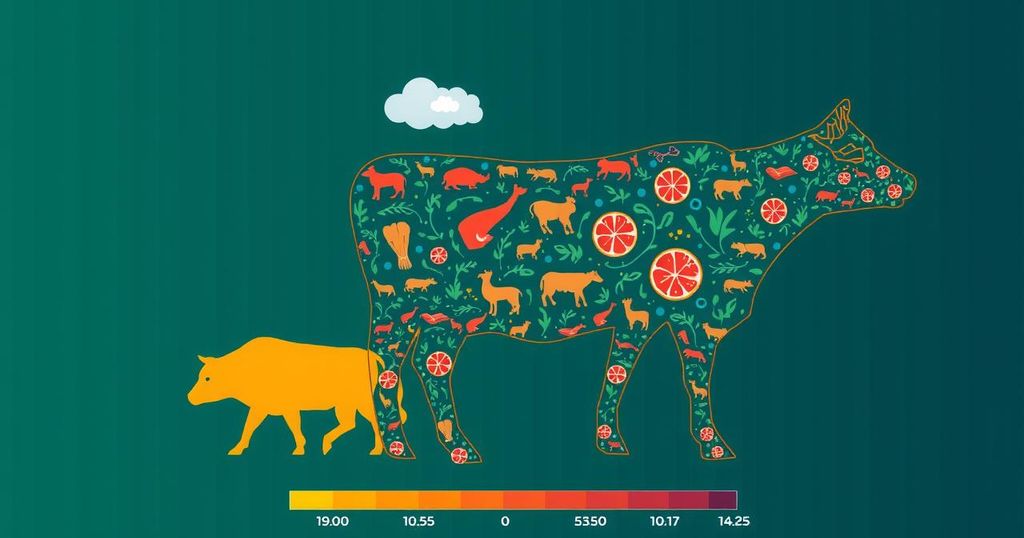Impact of Meat Production Reductions in Wealthy Nations on Climate Change

Modest reductions in meat production by 13% in wealthier countries could eliminate 125 billion tons of CO2, surpassing three years of total fossil fuel emissions. This reduction would promote forest regrowth, enhancing carbon sequestration. The study highlights the importance of targeted strategies to balance climate mitigation and food security without drastic changes to food systems.
A recent analysis reveals that modest reductions in meat production within wealthier countries could significantly contribute to combating climate change. By reducing meat output by approximately 13%, these nations could potentially eliminate around 125 billion tons of carbon dioxide from the atmosphere, surpassing the total fossil fuel emissions of the past three years. This reduction would facilitate the regrowth of forests on previously utilized pasturelands, thus enhancing carbon sequestration capabilities and helping mitigate global emissions substantially. The study, authored by Matthew N. Hayek from New York University, emphasizes the climate benefits achievable through relatively minor adjustments in global beef production. By concentrating on high-income regions that possess pasture areas with low grass yields, restoration efforts can maximize carbon capture while ensuring food supply stability. Removing livestock from historically forested pastures could enable ecosystems to revert back to their native states, with trees and soil playing a crucial role in carbon capture. The research highlights the effectiveness of this strategy in high- and upper-middle-income countries, as they often have less productive grasslands compared to regions with year-round grazing capacity. Importantly, the study advocates for enhanced efficiency in cattle management in lower-income areas, balancing the necessary reductions in production with sustainable food systems. Furthermore, the findings demonstrate an even greater potential for climate mitigation by completely removing grazing animals from all areas that could naturally restore forests. It is estimated that achieving this goal could sequester as much as 445 gigatons of CO2 by the end of the century, a figure equating to over a decade’s worth of current global fossil fuel emissions. While the study acknowledges that forest regrowth cannot entirely replace fossil fuel emission reductions, it proposes that ecosystem recovery serves as a compelling complementary solution to climate challenges. The research employed advanced remote sensing technology to determine pasture productivity, thus allowing accurate estimates of the potential climate benefits achievable through targeted reductions in beef production. The authors stress the importance of strategic planning and policies that prioritize areas for beef production reduction while facilitating forest recovery. Although ecosystem restoration cannot supplant efforts to reduce fossil fuel usage, it represents a crucial component in the wider framework of climate change mitigative tactics.
The increasing urgency of addressing climate change has prompted numerous scientists and activists to advocate for reductions in meat production, particularly in wealthier nations. This analysis stems from the understanding that livestock farming is a significant contributor to greenhouse gas emissions and land degradation. By exploring the impacts of lesser reductions in meat production specifically in high-income economies, researchers aim to provide viable solutions that can yield substantial environmental benefits without severely compromising food production. The study combines ecological insights with economic considerations, presenting a dual approach to environmental rehabilitation and food security.
In conclusion, the study highlights the immense potential for climate mitigation through modest reductions in meat production in wealthier nations. By reducing beef production by 13%, significant amounts of carbon dioxide can be sequestered, leading to forest regrowth on previously used pasturelands. The findings underscore the need for strategic policies that align climate goals with food security pursuits, driving home the importance of employing sustainable grazing practices and optimizing cattle management. Immediate action is essential to meet international climate change targets, and this research provides a framework for effective policymaking.
Original Source: www.eurasiareview.com






